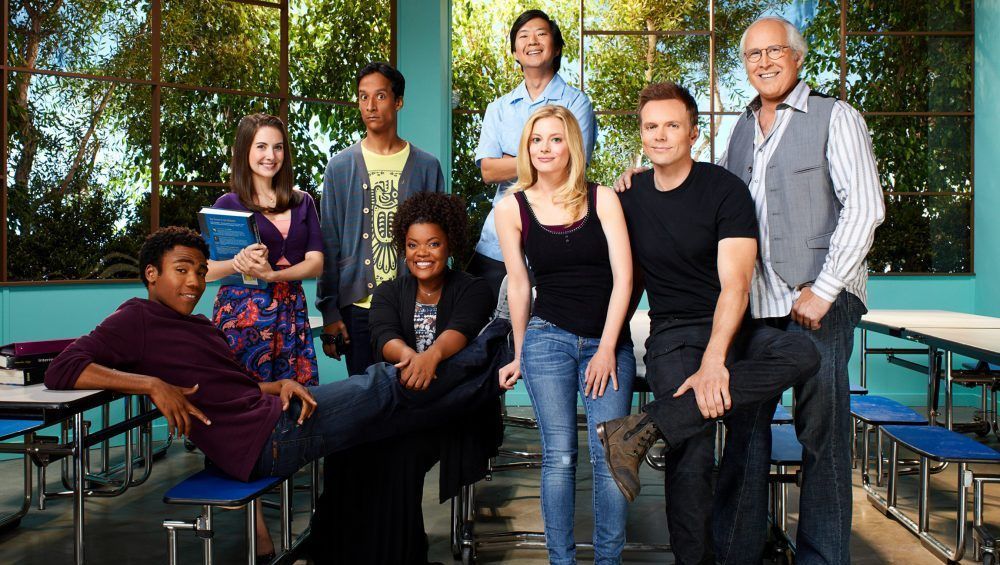
Community
Essential Viewing
Community is style and substance, perfectly combined.
Aimee Hallsworth
If you ask TV fans what the name Dan Harmon brings to mind, many will think of the smash hit comedy series ‘Rick and Morty’, Harmon’s sci-fi cartoon venture with Justin Roiland, which explores its universe with a unique blend of absurdist and nihilistic comedy. However, it is ‘Community’, Harmon’s perhaps less beloved show, that he holds to be his “crowning achievement”. ‘Community’ not only elevated Dan Harmon: it platformed Marvel’s juggernaut directors the Russo Brothers, relaunched the career of floundering funnyman Chevy Chase and gave ‘Atlanta’ creator and comedian Donald Glover his first hit role.
The show centres around the Campus of Greendale Community College, run by the bumbling and often hysterical Dean Pelton (Jim Rash). What starts as a mission by protagonist Jeff Winger (Joel McHale) to create a fake study group in order to get close to fellow student Britta (Gillian Jaobs) unfolds into a chaotic yet charming tale of a found family as the group develops throughout the six-season run.
The real strength of ‘Community’ lies in its genre, or rather its lack of genre. Although the show consistently centred on Greendale, viewers could expect anything but an average sitcom. One week, the show would style the study group as a Mafia family in a Goodfella’s chicken wing pastiche (“Contemporary American Poultry”), the next a pillow fort war in the style of a civil war documentary would be ravaging the campus (“Pillows and Blankets”). Its self-referential and satirical take on sitcom conventions had the show constantly peeking over the fourth wall but never crossing over, making for refreshing and memorable comedy. Key to this formula was Abed Nadir, a sensitively autistic coded character played perfectly by Danny Pudi. His special interest in American pop culture serves to signpost many of the show’s framing devices and deliver many of the series’ ‘show within a show’ jokes, making the self-reverent humour feel natural and ingrained within the show’s character dynamics.
One of the show’s strongest double bills, ‘A Fistful of Paintballs’ and ‘A Few Paintballs More’, perfectly show how Harmon uses genre hopping to create engaging and unique storylines. Warning - spoilers for the episodes ahead! The infamous ‘Community’ paintball episode had already been established as one of the strongest episodes of season one, and to capitalise on it in season 2 could simply have come off as a cheap gimmick. However, Harmon’s attention to character only ensured that it built well on the established tropes. The Western setting of ‘A Few Paintballs More’ serves as an exploration into the tensions between the study group and Pierce (Chevy Chase), their cantankerous and often coarse friend who served as the main antagonist of season 2. The episode centres around Annie (Alison Brie), the one member of the group who still believes in Pierce, and it ends in a gun duel between the two, as Pierce’s betrayal of Jeff breaks Annie’s faith. The Western backdrop creates a genuine tension, raising the stakes by transforming Greendale’s Campus into the dangerous frontier land of the Old West. Harmon then seamlessly moves the show into a ‘Star Wars’ pastiche to reflect the tonal shift in ‘A Few Paintballs More’ as the divided Greendale student body unites against the external threat of City College’s paintball army. This serves as a redemption arc for Pierce, who ends the game as Greendale’s champion. These absurd and amusing themes are tempered with sincere character moments and losses. ‘Community’ is style and substance, perfectly combined.
At the very heart of ‘Community’ are its characters. The study group are privileged with complexity beyond the tired archetypes most sitcoms rely on and their chemistry is completely absorbing. The seeming straight man Jeff Winger is shown to be just as eccentric as his contemporaries, as he sheds his cool and uncaring persona to create genuine bonds of lasting friendship with the group. Britta’s failing political activism and misguided good intentions create for great comedy and a brilliant contrast to the sweet, but often religiously hypocritical, Shirley (Yvette Nicole Brown). The friendship of Troy (Donald Glover) and Abed is where the show’s characters really shine: Abed’s emotional eccentricities are complimented wonderfully by Troy’s sensitive nature. The two add a beguiling sense of whimsy and charm to the show with their pop culture roleplays. However, closest to my heart is Annie, a highly motivated, caring and academic young woman. Although prone to over-analysing a given situation and outbursts of immaturity, her heart and love for her friends make her an incredibly compelling character - it’s a joy to watch her grow and mature as the show develops. Harmon doesn’t shy away from creating flawed and sometimes abrasive characters, but their depth of love for each other make them fantastically complex and ultimately, human.
It would be hard to write a review without acknowledging the numerous problems that plagued the production of ‘Community’: the constant threats of cancellation, antagonism between Chevy Chase and the rest of the crew and the infamous ‘gas leak year’ of season 4 from which Harmon was removed as creator (to name a just few). However, the show consistently set the bar for what network sitcoms could achieve, from its fantastic comedy, to its complex characters, to its engagement with pop culture. It has moved perfectly into the streaming era as thousands of new fans have discovered it online and joined its devoted fan base - it is perhaps even more enjoyable now than when it first aired.
Community is available to stream on Netflix, All4 and Amazon Prime.